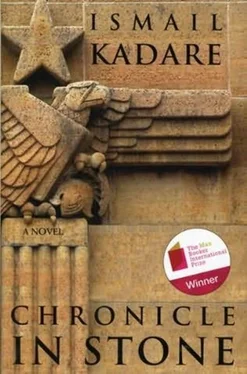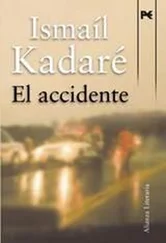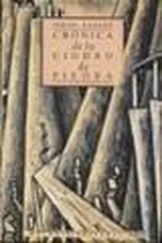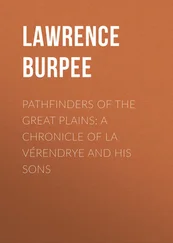Ismaíl Kadaré - Chronicle in Stone
Здесь есть возможность читать онлайн «Ismaíl Kadaré - Chronicle in Stone» весь текст электронной книги совершенно бесплатно (целиком полную версию без сокращений). В некоторых случаях можно слушать аудио, скачать через торрент в формате fb2 и присутствует краткое содержание. Жанр: Современная проза, на английском языке. Описание произведения, (предисловие) а так же отзывы посетителей доступны на портале библиотеки ЛибКат.
- Название:Chronicle in Stone
- Автор:
- Жанр:
- Год:неизвестен
- ISBN:нет данных
- Рейтинг книги:4 / 5. Голосов: 1
-
Избранное:Добавить в избранное
- Отзывы:
-
Ваша оценка:
- 80
- 1
- 2
- 3
- 4
- 5
Chronicle in Stone: краткое содержание, описание и аннотация
Предлагаем к чтению аннотацию, описание, краткое содержание или предисловие (зависит от того, что написал сам автор книги «Chronicle in Stone»). Если вы не нашли необходимую информацию о книге — напишите в комментариях, мы постараемся отыскать её.
Chronicle in Stone — читать онлайн бесплатно полную книгу (весь текст) целиком
Ниже представлен текст книги, разбитый по страницам. Система сохранения места последней прочитанной страницы, позволяет с удобством читать онлайн бесплатно книгу «Chronicle in Stone», без необходимости каждый раз заново искать на чём Вы остановились. Поставьте закладку, и сможете в любой момент перейти на страницу, на которой закончили чтение.
Интервал:
Закладка:
The season dragged on. It started to get cold again. The first claps of thunder rumbled somewhere over the horizon. Babazoti’s house got gloomier. Grandma quarrelled more and more with my younger aunt, who came and went happily, not paying the slightest attention to her mother, humming a song which had just come out:
We’re all so hungry and broke
Townspeople and plain country folk…
Grandma would listen and shake her head thoughtfully, as if to say: “This girl will break my heart.”
The first rain fell. It was time for me to go home. The sky was overcast. The wind blew in from the northern mountain passes. I went down Citadel Street, crossed the Bridge of Brawls, and was making my way through the town centre. It felt funny to be among the grey stone walls rising high on either side. The streets were strangely empty. Except that in a little square near the market a small crowd of people stood listening to someone making a speech. I stopped to listen. I didn’t know the speaker. He was a medium-sized man with greying hair who opened his arms wide from time to time as he spoke.
“In these times of turmoil we must try to love one another. Love will protect us. What can we gain from fratricidal struggle? Son will rise up against father, brother will fight brother. There will be rivers of blood. Let us drive civil war out of our town. Let us keep death out. For centuries the unhappy Albanian has gone through life with the heavy burden of a weapon on his back. Other nations think of food, but we Albanians care only for guns. Let us cast off that weight of steel, my brothers, for steel speaks only of strife. What we need is reconciliation. Civil war…”
The neighbourhood streets were completely deserted. The doors had a sly look about them. I walked faster. Where were all the people? I was almost running. My footsteps rang off the stones with a scary sound. More boarded doors. The metal door-knocker shaped like a human hand… No room at the inn!… But no, our gate, at least, stood ajar, waiting for me. I pushed it open and went in.
“You picked a great day to come back,” my mother said.
“What do you mean?”
She didn’t explain. Grandmother and Papa kissed me.
“Why did Mamma say I picked a great day to come back?” I asked Grandmother.
“They shot someone today,” she said. “He was wounded.”
“Who?”
“Gjergj Pula.”
“Really? Who shot him?”
“No one knows. The police are looking for suspects.”
“Did they ever find Aqif Kashahu’s daughter?” I asked.
“What made you think of Aqif Kashahu’s daughter?” Grandmother asked, almost reproachfully. “She’s away visiting some cousins.”
A partisan. A boy from the town centre had joined the resistance. A week before he had been a boy like all the others, with a home and a door with a knocker, who yawned when he was sleepy. He was Bido Sherifi’s youngest nephew. And suddenly he had become a partisan. Now he was up in the mountains. On the march. The high peaks were shrouded in winter mists that rolled down the gorges like nightmares. The partisan was up there somewhere. Everyone else was down here. He alone was up there.
“Why do they say: ‘He joined the resistance’?”
“You wear me out with your questions.”
Start of winter. I was looking at the first frost that covered the world and wondering what foreign land’s shreds and tatters would be blown to us by the winter wind this year.
FOURTEEN
Two truckloads of deportees were to leave that afternoon. The main square was swarming with people. Italian gendarmes came and went through the crowd. Heaped in the back of the trucks, the people who were being taken away had turned up the collars of their old coats. Many of them were holding little bundles, others were empty-handed. Almost all were silent. The crowd around them buzzed. Some women were crying. Others, especially the older ones, were giving advice. The men talked in low voices. The deportees kept quiet.
“What have they done? Why are they taking them away?” a passer-by asked.
“They spoke against.”
“What?”
“They spoke against.”
“What does that mean? Against what?”
“I’m telling you, they spoke against.”
The passer-by turned away.
“Why are they taking them away? What have they done?” he asked someone else.
“They spoke against.”
Bruno Arcivocale, commander of the city garrison, crossed the middle of the square, followed by a group of officers. There must have been a meeting at the town hall.
The truck engines had been idling for a long time. Then their monotonous hum in the square suddenly grew louder. The first truck revved up. Words spoken in loud voices, shrieks and cries came through the roar. The second truck also got into gear. The deportees waved. One of them shouted:
“Long live Albania!”
The square was full of excitement. In the end, the trucks made their way through a crowd that had surrounded them on all sides and drove off at speed.
The square emptied out. Apparently the meeting at the town hall had begun. Many guards were posted around the square. The streets were deserted.
Darkness fell on the city without those who had spoken against. Strangely enough, new leaflets were out that night. Lady Majnur left her house before dawn to report to the carabinieri.
Ilir came over that afternoon.
“Want to speak against?” he asked.
“Yeah, let’s.”
“But let’s be careful of spies,” he added a moment later.
“Where should we go?” I asked.
“Up on the roof.”
We went to Ilir’s house and climbed up to the roof unobserved. The view was spectacular. Thousands of roofs stretched away endlessly, steep and grey, as though they had turned over and over in a fitful sleep. It was very cold.
“You start,” Ilir said.
I took the lens from my pocket and put it over one eye.
“Dadadada, tatatata!” I said.
“Rabalama, paramara!” Ilir declared.
We sat and thought for a while.
“Long live Albania!” said Ilir.
“Down with Italy!”
“Long live the Albanian people!”
“Down with the Italian people!”
We fell silent. Ilir looked as though he had had a thought.
“No, that’s not fair,” he said. “Isa says the Italian people aren’t bad guys.”
“What’s he talking about?”
“It’s true. That’s what he says.”
“No,” I insisted. “If their planes are bad, how can their people be good? Can a country’s people be better than its planes?”
Ilir was shaken. He seemed ready to think again. But then just when he was about to change his mind, he said stubbornly, “No!”
“You’re a traitor,” I told him. “Down with traitors!”
“Down with the fratricidal struggle!” Ilir replied, putting up his fists as if he was about to box me.
We looked all around, automatically. We realised that we could easily have rolled off the roof.
Without another word we climbed down single-file and parted in anger.
Everyone was talking about the people who had joined the resistance. There were partisans from all the neighbourhoods, from Lower Palorto, Gjobek, Varosh, Cfakë, the central districts and the districts on the outskirts of town. But only one young girl had taken to the hills from Hazmurat.
Someone had brought news of the first casualty among the partisans. It was Avdo Babaramo’s younger son. No one knew where he had been killed or how. The body had not been recovered.
Avdo Babaramo and his wife locked themselves in the house for several days. Then he hired a mule for three months, collected some money, and set out to look for his son in the mountains. He was up there now, moving around.
Читать дальшеИнтервал:
Закладка:
Похожие книги на «Chronicle in Stone»
Представляем Вашему вниманию похожие книги на «Chronicle in Stone» списком для выбора. Мы отобрали схожую по названию и смыслу литературу в надежде предоставить читателям больше вариантов отыскать новые, интересные, ещё непрочитанные произведения.
Обсуждение, отзывы о книге «Chronicle in Stone» и просто собственные мнения читателей. Оставьте ваши комментарии, напишите, что Вы думаете о произведении, его смысле или главных героях. Укажите что конкретно понравилось, а что нет, и почему Вы так считаете.












